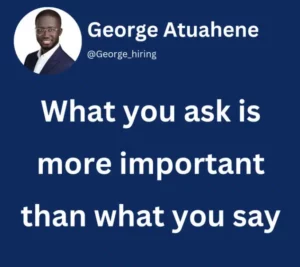Interview Questions to Ask Technical Talent for Your Startup

Hiring technical talent is critical for startups because every new engineer can greatly impact the company’s growth and success. But how do you know if you’re asking the right interview questions?
Here are some important questions to help you determine if a candidate is the right fit for your team.
Understanding their Decision Framework
“If you could eliminate one responsibility from your current/last job, what would it be?”
Why ask? This question can highlight which tasks they find unfulfilling or frustrating, helping you gauge their fit for the role. While everyone has preferences, you want to make sure their dislikes don’t align too closely with your job’s core responsibilities.
“What are the most important things you consider when evaluating opportunities?
Why Ask? This helps you understand what drives the candidate, whether it’s career growth, company mission, or technology stack. Knowing their priorities will show you if your startup can genuinely meet their expectations and if they’re likely to stick around long-term.
“If you had several offers with similar compensation, work arrangements, and similar companies, how would you decide between them?”
Why Ask? This question uncovers the deeper factors influencing their decision-making. It’s a great way to see what sets your offer apart and whether your company’s values and culture will resonate with them.
“What are your long-term career goals and how does joining a startup help you to accomplish them?
Why Ask? This shows whether the candidate has a clear vision for their career and if they see your startup as a strategic stepping stone. It’s crucial to align their aspirations with what your company can realistically offer.
“How do you value equity?”
Why Ask? Startups often use equity to attract top talent, so understanding how candidates perceive its value helps you gauge if they have a solid understanding of risk versus reward. It also highlights whether they’re in it for the long haul or just looking for immediate benefits.
Technical Questions
“What’s the most challenging technical problem you worked on? What made it challenging and how did you resolve it? What did you learn in the process?”
Why Ask? This question reveals not only a candidate’s technical depth and problem-solving abilities but also their critical thinking and resilience. It allows you to see how they approach complex situations, manage stress, and apply creativity to find solutions. Plus, their response can give you insight into their ability to learn from tough experiences—a key trait for thriving in a startup environment.
“Can you walk me through a project where you solved a complex technical problem?”
Why ask? This question helps gauge problem-solving abilities and whether they can handle the kind of challenges your startup might face. A detailed response shows they can break down complicated problems and explain their solutions clearly.
“What technologies do you prefer and why?”
Why ask? It’s not just about knowing a stack; it’s about understanding their thought process when choosing tools. This can reveal whether they have strong opinions based on experience or if they’re adaptable and open to new options.
“How would you optimize an existing system that’s currently running slowly?”
Why ask? This gives insight into their debugging and optimization skills—two areas crucial for startups where efficiency is key.
“What are the trade-offs between using X technology versus Y?”
Why ask? Startups need engineers who understand that there’s no one-size-fits-all solution. A thoughtful answer will show they can weigh the pros and cons of different approaches and make strategic decisions.
“How would you design [insert relevant system here]?”
Why ask? This question dives deep into their technical acumen and ability to architect systems from scratch, a must-have skill if your startup is building something unique.
“How do you balance the need to move quickly versus minimizing technical debt?”
Why Ask It: This question assesses whether the candidate can find the right balance between delivering fast results and maintaining code quality. It’s crucial for startups where speed is essential, but long-term success depends on scalable, maintainable systems. Their response will help you gauge if they understand when to prioritize speed and when to invest time in building a solid technical foundation.
Behavioral Questions
“How do you decide what to work on?”
Why ask? This question reveals how they prioritize tasks and make decisions independently. Startups need team members who can manage their own workload effectively without constant guidance, making this a crucial trait to evaluate.
“Have you ever been required to make important decisions with limited information? If so, how did you go about it?”
Why Ask It: Startups often operate in environments of uncertainty, and making decisions without a full picture is part of the game. This question helps you understand the candidate’s decision-making process, risk tolerance, and ability to act confidently with incomplete data. Their approach can show if they’re adaptable, resourceful, and able to move forward without getting stuck in analysis paralysis.
“What do you think our company could do better, and how would you contribute to that?”
Why ask? This question measures how well they’ve researched your company and whether they can offer actionable insights. It also helps determine if they’re willing to speak up and drive improvements—a great sign for a proactive team member.
“What’s something you’ve taught yourself in the last six months?”
Why ask? This demonstrates a candidate’s willingness and ability to learn independently, which is critical for startups that need employees who can quickly adapt to new technologies and methods.
“What do you need from your manager and the company to be successful?”
Why Ask? Understanding a candidate’s expectations around support and communication can help you determine if your management style and company culture align with their needs.
“Can you tell me about a time when you had to collaborate with a team to meet a tight deadline?”
Why ask? In a startup, collaboration is key. You want someone who can thrive in fast-paced, team-oriented environments. This question helps assess their teamwork and time-management skills.
“What motivates you to work on a challenging project?”
Why ask? Startups often deal with ambiguity and steep learning curves. Understanding what drives a candidate will show if they’re aligned with the company’s culture and goals.
“Have you ever had to pivot on a project? How did you handle it?”
Why ask? Startups are always evolving. This question reveals whether they can handle sudden changes and adapt without missing a beat.
“What’s the biggest mistake you’ve made in a project, and how did you learn from it?”
Why ask? You don’t just want someone who’s technically strong—you want someone who can learn from setbacks and grow.
Pre-Closing Questions
“How does the role we discussed align with your long term career goals?”
Why Ask? This question helps determine if the candidate views this role as a strategic move for their career rather than a short-term stopgap. You want to ensure their aspirations match what your company can provide, which will increase the likelihood of long-term commitment.
“How well do you understand what we do and the role we’re hiring for? What aspects are still unclear to you?”
Why Ask? It tests how well the candidate has researched your company and role, showing their level of genuine interest. Plus, their questions can reveal how they process information and what matters most to them in a job.
“How does this opportunity compare with other companies you’re interviewing with?”
Why Ask? This question gives insight into what the candidate values most—whether it’s company culture, technical challenges, or benefits. Knowing how your opportunity stacks up can help you highlight what makes your startup unique and refine your pitch.
“What’s your timeline for making a decision, if presented with an offer?”
Why Ask? Understanding their timeline helps you manage your own hiring process and ensures you don’t lose top talent due to mismatched expectations. It also signals how actively they’re considering other opportunities.
“Assuming we presented you with an offer, is there anything that would keep you from accepting it right away?”
Why Ask? This question surfaces potential objections early, giving you the chance to address concerns before you extend an offer. It’s a proactive way to understand the candidate’s hesitations and clarify anything that might stand in the way of closing the deal.
Why These Questions Matter for Startups
Startups need more than just coders—they need versatile problem-solvers who can handle ambiguity, work well in small teams, and adapt to fast-changing environments. These questions help assess not only technical skill but also how well the candidate aligns with your startup’s culture and goals. The right answers can reveal whether they’re up for the challenges of a growing company or if they’re better suited for a more structured environment.
Pro Tip
Don’t just focus on the answers—pay attention to how candidates approach each question. Are they thoughtful? Do they communicate clearly? Do they show curiosity? All of these are indicators of how they’ll perform if you bring them on board.

Additional Insights
From Intro Call to Offer Stage: The Most Effective Interview Process for Hiring Engineers
6 Best Practices for Interviewing Engineers
Share This Blog
Kofi Group has helped 100+ startups hire software and machine learning engineers. Will fill most of the roles we recruit on with 5 or less candidates presented.
Contact us today to start building your dream team!


